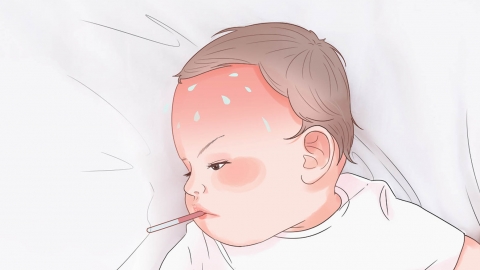What causes recurrent fever in children?
Generally, the main causes of recurrent fever in children include environmental temperature fluctuations, reactions after vaccination, acute upper respiratory tract infections, infantile exanthem (roseola), and suppurative tonsillitis. If the fever persists or is accompanied by other symptoms, it is recommended to seek timely medical attention at a正规 hospital. Detailed explanations are as follows:
1. Environmental Temperature Fluctuations
Children's thermoregulatory centers are not yet fully developed. Sudden changes in ambient temperature or improper adjustment of clothing can easily lead to fluctuating body temperatures. Maintain indoor temperature between 22–26°C, adjust clothing according to body temperature, avoid overdressing, and offer plenty of warm water to help stabilize body temperature.
2. Post-Vaccination Reactions
Vaccines act as foreign substances that stimulate the immune system, potentially causing mild fever lasting 1–2 days. During fever, use lukewarm water sponge baths for physical cooling, ensure adequate rest, and maintain a light diet. If body temperature exceeds 38.5°C, acetaminophen suspension may be administered under medical guidance.

3. Acute Upper Respiratory Tract Infection
Viral or bacterial infections of the respiratory tract trigger inflammatory responses, leading to recurring fever. For viral infections, medications such as pediatric paracetamol-phenylpropanolamine granules or ribavirin granules may be taken as directed by a physician. Bacterial infections require antibiotics such as amoxicillin-clavulanate potassium dry suspension. Prompt fever management and sufficient fluid intake are essential.
4. Infantile Exanthem (Roseola)
Caused by human herpesvirus 6, this condition typically presents with high fever followed by a rash. During high fever, ibuprofen suspension can be given along with physical cooling methods. Avoid excessive bundling. Once the rash appears, keep the skin clean. No specific medication is required, as symptoms resolve spontaneously.
5. Suppurative Tonsillitis
Bacterial infection leads to purulent inflammation of the tonsils, causing persistent high fever due to inflammation. Treatment under medical supervision may include cefaclor dry suspension, azithromycin dry suspension, or Pudilan anti-inflammatory oral liquid. If tonsillar swelling affects breathing or if infections recur frequently, tonsillectomy may be considered after controlling the inflammation.
In daily life, adjust children’s clothing promptly according to weather changes, ensure good indoor ventilation, and maintain a balanced diet to enhance immunity. If fever recurs for more than three days, prompt medical evaluation is necessary to determine the underlying cause.








